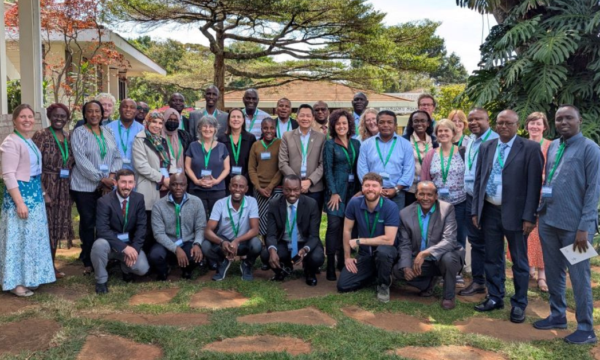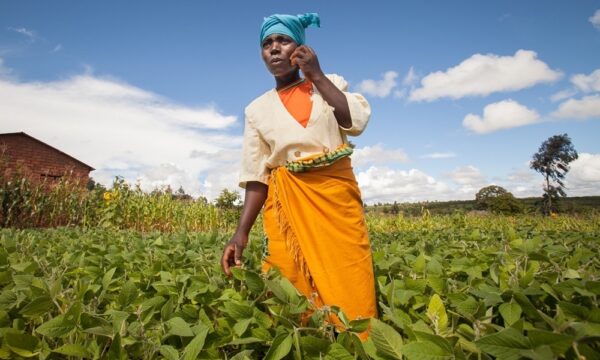
In sub-Saharan Africa, economic growth from agriculture is 11 times more effective at reducing extreme poverty compared with any other sector. In Kenya, 71% of the rural population work in the agriculture sector, accounting for nearly 70% of export earnings.
Therefore, crop and livestock health are crucial to the livelihoods and agricultural productivity of farmers in sub-Saharan Africa. Yet, the ‘One Health dimension’ of agricultural systems also needs attention.
In a survey conducted by CABI scientists at its regional centre for Africa in Nairobi, Kenya, it was found that awareness could be higher on selected ‘One Health issues’ among smallholder farmers. The results have been outlined in a new CABI study brief.
These findings link to a broader shortage of farmer advisory services in many areas of Africa, caused by understaffed and underfunded agricultural extension services – leaving farmers with insufficient knowledge about crop and animal health, as well as the broader connections between plant, animal, human and environmental health.
The survey
Building on their longstanding knowledge around plant clinics, CABI researchers explored ‘One Health benefits’ of crop-livestock clinics, piloted in Uganda from 2021. Following this, a household survey was conducted before the onset of a Kenyan pilot in 2022.
The survey included 319 farmers (56% male, 44% female) in five Kenyan counties. Two of these counties, Elgeyo Marakwet and Trans-Nzoia, were chosen to pilot the joint crop-livestock clinic.
In addition to farmer awareness of One Health issues, the survey aimed to determine the information needs on crop and livestock farming. It also sought to learn about perceptions among farmers of joint crop-livestock clinics and information needs on livestock and crop farming.
Awareness of One Health issues
- Mycotoxins
Smallholder farmers were asked whether they were aware of the problems in crops, grain and fodder that could affect animals or people. Mycotoxins were identified by 80% of the farmers, who connected them with the poor drying of grain (75%), poor storage of grain (57%), and feeding livestock with spoilt grain (20%).
However, most farmers did not know that consuming milk, meat, or eggs from animals that were fed on aflatoxin-contaminated grain may cause health problems, or that delayed harvesting of their grain may worsen aflatoxin problems.
- Zoonotic diseases
Farmers in the survey were generally well-informed about diseases in animals that can affect humans (zoonoses), with over 80% having heard of diseases such as brucellosis, anthrax and rabies. However, they were less familiar with trypanosomiasis and Rift Valley Fever – two diseases that are prominent in Kenya.
There was also a knowledge gap around how to avoid zoonotic diseases. Proper cooking of animal products (83%), avoiding handling of dead animals (54%) and vaccination (12%) were cited as the main ways to counter infection from zoonotic diseases.
However, farmers did not mention several key health practices. These include observing proper hygiene when handling animal products, not handling carcasses or dead foetuses, and not eating meat that hasn’t been properly inspected.

Demand for joint clinics
The survey found that there was a clear demand for the type of integrated service offered by joint crop-livestock clinics. Ninety percent of the households owned poultry, while half kept sheep, goats, and multipurpose cattle – while one-third of households owned dairy cattle. Maize (88% of households) and beans (66%) were the most grown crops.
These figures show that most farmers practised mixed farming, indicating that joint clinics were likely to be valuable. In addition to specific crop and livestock diseases, farmers also requested information on good husbandry, disease prevention and safety in use of pesticides and drugs.
Most farmers (65%) were also happy to pay for advice, when visiting the clinics, with most saying that they would pay if the services were satisfactory or of good quality. The convenience and time saved by receiving advice from one location was also listed as a positive factor by those taking part in the survey.
Way forward
Christine Alokit, Communication and Extension Scientist for CABI, said: “Joint crop-livestock clinics are more than a one-stop centre for farmers to seek a range of advice. They provide local and national governments with an opportunity to work across different sectors to create awareness on One Health problems such as mycotoxins, zoonoses, hygiene and pesticide and vet drug misuse.”
She also highlights how joint clinics can foster collaboration and knowledge sharing between different actors in the sector: “They allow advisory service experts (livestock/vet and crop production professionals) to consult directly with government officials (public health, environmental and/or fishery officers) – with joint clinics being run by both sets of officials. Moreover, the clinics offer a platform for expertise and knowledge to be shared and leveraged across sectors, and for capacity to be built in areas that are lacking.”
Additional information
Main image: Plant health clinic in Uganda (Credit: CABI).
CABI project
https://www.cabi.org/projects/joint-crop-and-livestock-services-for-smallholder-farmers/
Related News & Blogs
Training delivered on early warning system using Earth Observation data to help manage crop pest pests in Kenya
CABI has teamed up with the Kenya Agricultural & Livestock Organization (KALRO) to deliver training aimed at helping smallholder maize, bean and tomato farmers understand important crop pest alerts derived from Earth Observation data. Experts in di…
30 April 2025




